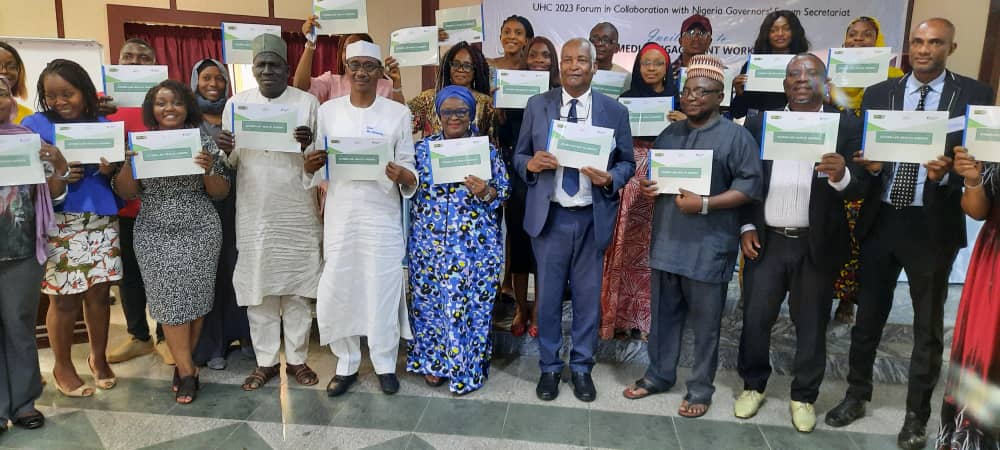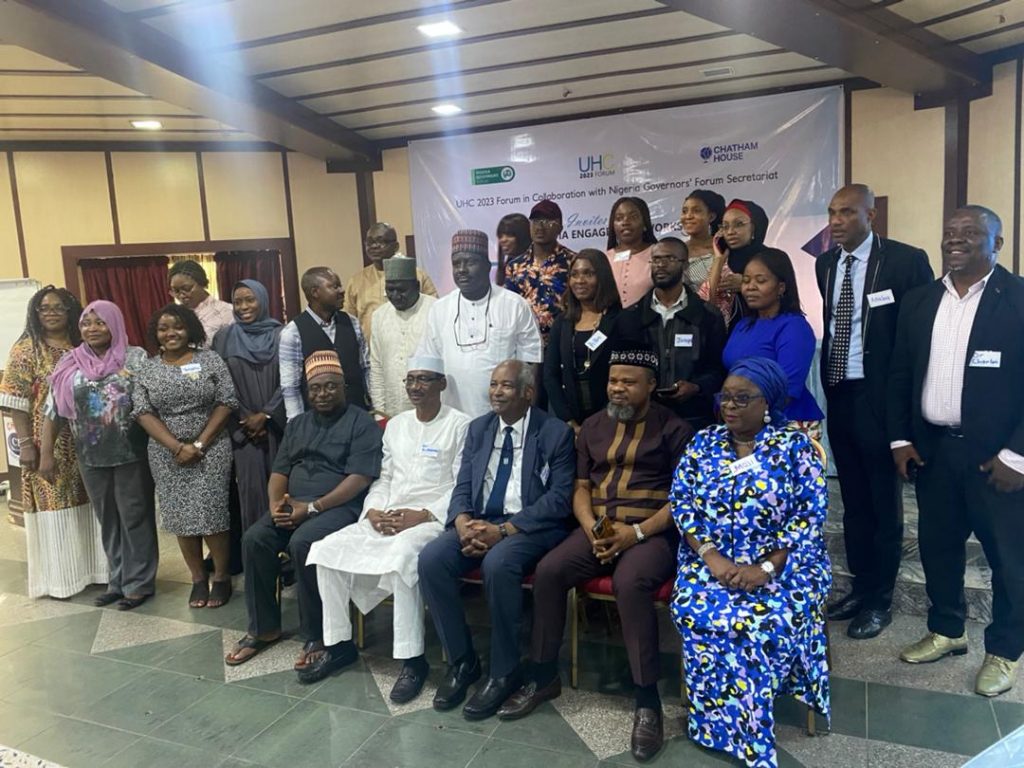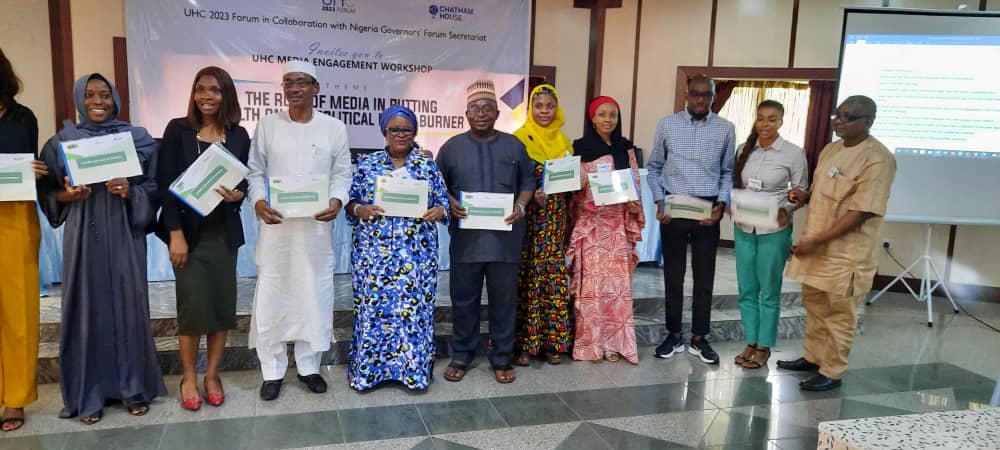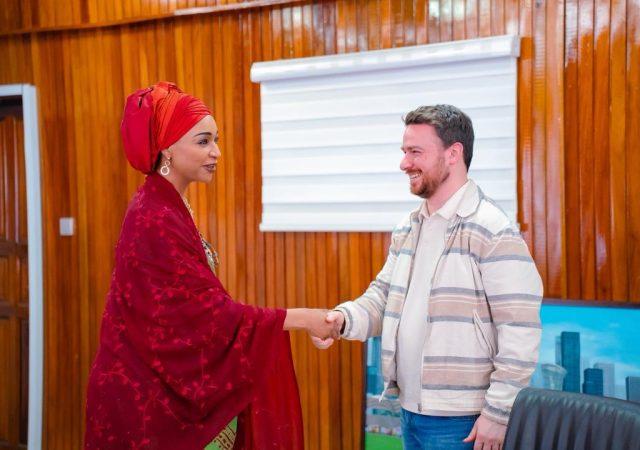
By Sunday Oyinloye
“I am hopeful that our women will no more be dying during childbirth; our children will no more be dying as a result of vaccine preventable diseases or common ailment; access to health care will not be limited because of not having money to pay.” These were the words of President Muhammadu Buhari assuring Nigerians of improvement in the health sector
Unfortunately, the health delivery system in Nigeria today is not something that the citizens can be proud of. Many women are still dying during childbirth while thousands of children are still dying yearly as a result of vaccine preventable diseases and malnutrition triggered sicknesses.
Little wonder, what was supposed to be one day media engagement workshop organised by UHC 2023 Forum last week literally turned out to be lamentations by journalists and other stakeholders who have one sad story or the other to tell about the state of Nigeria’s health sector.

The UHC 2023 Forum is a coalition of a wide array of stakeholders including donor agencies, development partners, and civil societies that are committed to taking advantage of the policy-reset window that will be created by the forthcoming general elections to put Universal Health Coverage on the political front burner.
The platform aims to mobilize health policy advocates, the media, citizens and political class towards charting a narrative-changing course of action that will accord the health sector appropriate political attention and set Nigeria on the course of UHC
UCH 2023 Forum is being supported by Chatham House and Nigeria’s Governors’ Forum.
One of the most respected Nigerian doctors is Professor Oladapo Ladipo, the first Nigerian to be elected as the President of African Federation of Obstetrics and Gynaecology .He could not hide his feelings about the state of Nigeria’s health sector at the workshop. He says his heart bleeds for a sector that has witnessed brain drain and decay in infrastructure even as he observes that the media has not fully engaged in health discourse.

According to him, the nation would have been saved the embarrassment of the travails of the former Deputy Senate President, Ike Ekweremadu if the health sector had been put in proper shape.
Ladipo who is the Lead/Co-founder, President and Chief Executive Officer of the Association for Reproductive& Family Health however tasked the media to work hard and ensure that politicians put health on the front burner as the nation approaches another election stressing that part of the reasons why Rwanda is what is it today is because President Paul Kagame made health a priority.
His words: Health is wealth, no nation can develop without healthy citizens’ .In Rwanda, their President made health a priority, but in Nigeria health is not a priority. My health bleeds when I see the state of our health system, but the media can help to reverse that, so that health can be on the front burner of our national discourse”
Ladipo also charged the media to embrace investigative Journalism and probe why part of the money being allocated to the health sector is not spent to improve the health care system.
“The media should do more of investigative journalism. I know that investigative Journalism is not cheap, the media owners should provide funds for reporters to do investigative stories “ he said
The renowned Obstetrician and Gynecologist advised the government to focus on security, health and education and challenged the media to follow up of these three critical sectors.
He was not the only one concerned about the health system, the Executive Director Center for Universal Health, Chatham House, London, Robert Yates is also concerned.
While speaking on “The UHC quest and the media lessons from around the globe” Robert said with all the resources and potentials Nigeria has, its health sector has not been given the desired attention by the politicians
According to him” Nigeria’s Public Health Spending has been Flatlining. This has implications for health outcomes .Nigeria’s GDP per capita is 6 times that of Malawi but its child mortality rate is 140% higher”
He cited an example where a mother of twins was alleged to have been detained in Umuahia ,Abia State over her inability to pay N250,000 medical bill, something he described as unacceptable.
Robert who noted that politicians use the media to get to power challenged Journalists to put pressure on them so that they could make the health sector a priority. He said Journalists should also hold politicians accountable.
The Executive Director said that Thailand is doing well in terms of UHC adding that politicians in India are now putting health on the front burner .He believes same thing could be done in Nigeria as the nation approaches 2023 elections.
Speaking in the same vein, Chair The Health Advocates, Hon. Muhammad Usman said the political class has failed in their responsibilities which has led to the” total collapse of the health sector”
The former Deputy Chairman, House of Representatives Committee on Health said the money being budgeted for health is not enough and part of what is not enough is also being looted.
“The money being allocated to the health sector is not enough and even part of this is still being looted. The citizens too have failed because they are not holding the leaders accountable”.
While warning that corruption would continue to have negative effects on the health sector, Hon. Usman however advised Nigerians to change their attitude and shun money politics in the 2023 elections.
The Managing Editor, Northern Operations of The Nation Newspaper, Yusuf Ali who was also at the workshop also lamented at the state of Nigeria’s health sector and the need for all hands to be on deck to turn the sector around.
Going down memory lane, he said University College Hospital, Ibadan used to be a centre of excellence and wondered why some of the tertiary hospitals in Nigeria today are in poor shape.
The Managing Editor while sharing an experience said he took a patient to a certain University Teaching Hospital where power was only available for two hours in 24 hours and where he had to go outside of the hospital to buy hot water at the rate of N300 per flask. The same hospital he revealed does not have enough wheelchairs.
The President of Nigeria Union of Journalists (NUJ) Chris Isiguzo in his remarks said the primary and secondary health care have collapsed in the country and challenged journalists to begin to draw the attention of policy makers to health issues
In his words: “As a country, we must begin to change the way we think and the media is a strategic partner in the Nigerian project, we have the responsibility of ensuring that health is given the desired attention by our politicians
“It is unfortunate that the primary and secondary health care have collapsed in the country. That is why everybody is running to Teaching Hospitals to treat ailments that are supposed to be treated at the primary and secondary levels. As journalists, we must begin to draw the attention of policy makers to the health issues because media is strategic partner in the Nigerian project” he said.
The Chairman of Association of Nigeria Health Journalists (ANHEJ), Hassan Zaggi also shared his unpleasant experience in one of the government hospitals.
According to him “there are no cancer machines in our hospitals and infant mortality is still high”
The representative of USAID at the workshop, Peter Egena disclosed that Ghana is doing well in its Health Insurance programe adding that Nigeria could do the same.
Peter also aligned himself to other speakers who challenged the media to use the coming elections to put health on the front burner stressing “Journalists should begin to hold the politicians accountable”
In her remarks, the Chair, UHC 2023 Forum, Moji Makanjuola said there is a huge gap in the health care system and policy formulation .She notes “to turn around the health sector, we should begin to do things differently”
Makanjuola who is the Executive Director of International Society of Media in Public Health challenged journalists to begin to ask politicians their agenda for health ahead of the 2023 elections
“During the Presidential debate, health should be on the front burner because a healthy nation is a wealthy nation. The Media should ask all of them, their plans for the health sector” she said
The veteran journalist, charged the media to focus more on investigative journalism and not to be events journalists as the task ahead is enormous if the health sector is to be turned around
Her words “Since the first outing in 2021, we have continued to build stronger block of like minds who believe in our approach. Today’s engagement with the media is to catalyze the media in health agenda for improved health care using the effective platforms that man ever evented and created.
“As a country and as a people there is a huge gap in the health sector not only in service delivery but also in policy implementation. We need to start doing things differently to ensure accountability and efficiency in the health sector “
The Managing Partner, DCI Consult, Dr. Gafar Alawode in his paper titled “Understanding the concept of UHC” went historical lane on how UHC has evolved over the years.
He said in December, 2012, United Nations General Assembly endorsed a resolution urging countries to accelerate progress toward universal health coverage-the idea that everyone should have access to quality, affordable health care as an essential priority for international development.
Alawode explained that UHC is about ensuring that people have access to the health care they need without suffering financial hardship stressing that UHC is key to ending extreme poverty.
In his word “The whole concept of UHC is to ensure that everybody has access to health. There should be financial protection, which means citizens should not spend fortunes to access health”
He observes that there is the need for the media to sensitize the politicians and the citizens that an investment in health is for the development of the country adding “giving attention to health represents a foundational investment in human capital and in economic growth”
Journalists at the workshop later made commitments that they would do more in the area of holding the politicians accountable and also work towards putting health on the front burner of national discourse
As Nigeria prepares for the 2023 elections, all eyes are on the media to put those seeking political offices on their toes, so that they can tell the citizens their plans for the health sector.









